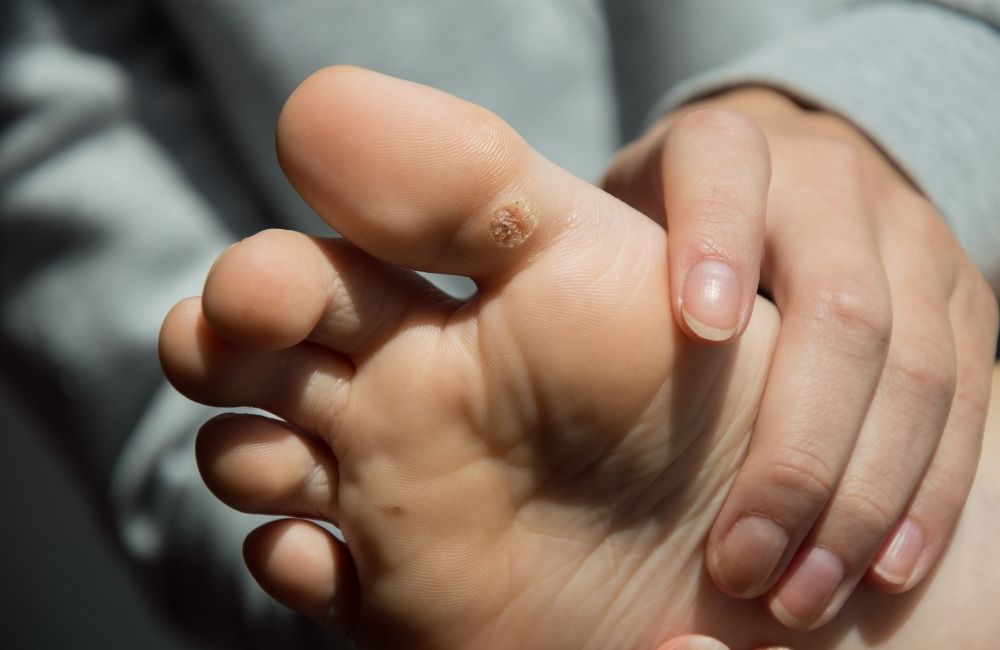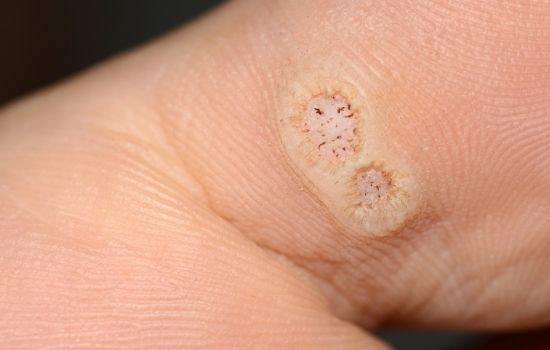You’ve probably heard of them – chances are you or someone you know has had one at some point in their lives. They are a very common skin problem that podiatrists see every day! But what are plantar warts?

So, what are plantar warts?
A wart is a viral infection caused by the human papillomavirus (HPV). HPV has many variations – over 100! It can occur on multiple parts of the body such as the face, hands and genitals. Some forms can be cancerous, but most (like those on our feet) are completely benign growths of extra skin, often described as having a ‘cauliflower-like’ appearance. Warts on feet are a form of these growths commonly caused by HPV types 1, 2, 4, 60, and 63.
The difference between warts on other parts of the body and plantar warts is simple; being on the bottom of the feet means plantar warts are pressed into the skin rather than grow on top. This often makes plantar warts a much more noticeable and painful type of wart; it is no wonder people often seek out help to get rid of them!
Who gets them and why?
Anyone can get a wart, but some people appear to be more prone to getting them than others. The HPV virus is extremely contagious and can be spread easily; either through direct skin contact with an existing wart, or through indirect contact with a surface another wart has touched, such as the floor of a communal change room. Warts are more likely to be contracted if there is a break in the skin such as a cut, or when the skin is warm and moist.

A person’s immune system is one of the main factors for whether they contract a wart or not. People immunocompromised via certain medical conditions or medications are more likely to get them, and so are children. In fact, plantar warts are incredibly common in children as their immune systems are still in development. They are also more likely to be in communal areas where the wart virus is present, such as public swimming pools and changing rooms.
How do I know it’s a plantar wart?
This can be tricky sometimes! Plantar warts normally show up with a ‘cauliflower-like’ appearance with little black dots inside (which are actually tiny blood clots). However, plantar warts will often develop a layer of callus (hard skin) over the top. This can make them look like a corn. Corns are hard, compressed skin cells which your podiatrist can treat. Confusing a plantar wart for a corn is one of the most common mistakes that even trained professionals can make! Find out when you should see a podiatrist for a plantar wart.
There are a few clues that help diagnose a wart:
- The skin striations (lines in your skin – just like your fingerprints!) will travel around the wart, rather than passing through the spot as they would in a corn.
- The wart will bleed when damaged, whereas a corn will not.
- Warts spread, grow larger and if picked can grow warts on other areas of skin.
- The spot will usually be more painful when pinched or squeezed at the sides, whereas a corn can be sore when pressed on directly.
A podiatrist is the best person to diagnose and treat a plantar wart. So if you have any questions about whether or not you have a wart, do give them a call!

When will plantar warts go away?
Unfortunately there is no simple answer for this question. It may take months, years, or it may never go away on its own. Like any viral infection, you are relying solely on your body’s immune system to fight it off. The challenge with plantar warts is that the virus that causes them often goes undetected by your body’s immune system. That said, most people will fight off warts within about 2 years with no external intervention whatsoever. Kids are particularly good at fighting off the virus naturally as their immune system continues to develop.
If the feel or appearance of plantar warts are bothering you and you don’t want to wait years for resolution, don’t worry, there are treatments available to speed things along! Including SWIFT Microwave therapy. Just ask your podiatrist.